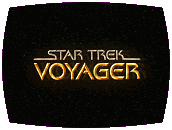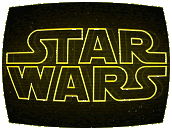 With the advent of television in America, the radio drama – a staple of wartime and post-war American radio listening – gradually became all but extinct. Even if the audience hadn’t shifted toward TV, the talent behind radio was making a beeline for Hollywood to stake a claim on the new medium. Radio drama made a modest comeback in the 1970s via the newly-established National Public Radio, but never quite on the scale of radio drama’s heyday in the war years. Radio theater remained the domain of talented amateurs and occasional public broadcasting showcases. Even NPR found itself leaning heavily on the still-active radio drama scene in England – it was more financially expedient to buy rebroadcast rights to already-produced British radio shows such as The Lord Of The Rings and The Hitchhiker’s Guide To The Galaxy, which instantly gained avid American fan followings. Comedy fared better: Garrison Keillor’s Prairie Home Companion became a mainstay of NPR’s non-news-based offerings.
With the advent of television in America, the radio drama – a staple of wartime and post-war American radio listening – gradually became all but extinct. Even if the audience hadn’t shifted toward TV, the talent behind radio was making a beeline for Hollywood to stake a claim on the new medium. Radio drama made a modest comeback in the 1970s via the newly-established National Public Radio, but never quite on the scale of radio drama’s heyday in the war years. Radio theater remained the domain of talented amateurs and occasional public broadcasting showcases. Even NPR found itself leaning heavily on the still-active radio drama scene in England – it was more financially expedient to buy rebroadcast rights to already-produced British radio shows such as The Lord Of The Rings and The Hitchhiker’s Guide To The Galaxy, which instantly gained avid American fan followings. Comedy fared better: Garrison Keillor’s Prairie Home Companion became a mainstay of NPR’s non-news-based offerings.
In 1981, NPR affiliate station KUSC, based at George Lucas’ alma mater, the University of Southern California, hatched a bold plan to adapt Lucas’ Star Wars for radio. Easily the most visual film of the past decade, Star Wars as a listening experience seemed like an unlikely idea, but Lucas sold NPR and KUSC the rights to adapt the hit movie for one dollar, and opened the Lucasfilm vaults to the  show’s producers: the Star Wars sound effects would be available to them in their raw form, along with every note of John Williams’ music, including selections that had yet to appear on an album. The somewhat unenviable task of translating a visual-effects-heavy blockbuster to the spoken word was given to writer Brian Daley, who had already produced some of the earliest official Star Wars print fiction that didn’t merely adapt the two movies so far (“Han Solo And The Lost Legacy,” “Han Solo At Stars’ End,” “Han Solo’s Revenge”).
show’s producers: the Star Wars sound effects would be available to them in their raw form, along with every note of John Williams’ music, including selections that had yet to appear on an album. The somewhat unenviable task of translating a visual-effects-heavy blockbuster to the spoken word was given to writer Brian Daley, who had already produced some of the earliest official Star Wars print fiction that didn’t merely adapt the two movies so far (“Han Solo And The Lost Legacy,” “Han Solo At Stars’ End,” “Han Solo’s Revenge”).
Daley expanded slightly over two hours of movie into thirteen half-hours of radio, primarily by expanding on the events in the movie’s earliest scenes, going further back in time to give listeners 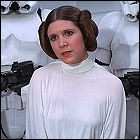 a “look” into Luke Skywalker’s dull Tatooine life (and constantly being teased by his friends for being a dreamer of far-fetched dreams), and his friendship with future Rebel pilot Biggs. Also explored was Princess Leia’s life on Alderaan with her father, Bail Organa, and their activities with the the Rebel Alliance leading up to the theft of the Death Star plans. If one can overlook a certain naivete on Bail Organa’s part when it comes to the Rebellion (in the prequel trilogy, Organa is shown to be one of the Rebellion’s founding fathers, not hesitating to rescue and shelter the last two Jedi Knights known to have survived the Emperor’s “Order 66”), the events portrayed actually track very well with the story revelations that came in the later movies.
a “look” into Luke Skywalker’s dull Tatooine life (and constantly being teased by his friends for being a dreamer of far-fetched dreams), and his friendship with future Rebel pilot Biggs. Also explored was Princess Leia’s life on Alderaan with her father, Bail Organa, and their activities with the the Rebel Alliance leading up to the theft of the Death Star plans. If one can overlook a certain naivete on Bail Organa’s part when it comes to the Rebellion (in the prequel trilogy, Organa is shown to be one of the Rebellion’s founding fathers, not hesitating to rescue and shelter the last two Jedi Knights known to have survived the Emperor’s “Order 66”), the events portrayed actually track very well with the story revelations that came in the later movies.
Acting out Daley’s scripts in the KUSC recording studios would be a mixture of original Star Wars cast members, Hollywood veterans, actors who nearly had a shot at intergalactic 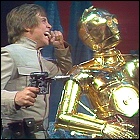 fame, and future TV and movie stars still in the early stages of their careers. Mark Hamill and Anthony Daniels reprised their roles of Luke Skywalker and C-3PO, while familiar sound effects eliminated the need to recast R2-D2 or Chewbacca. Though he lost the role to Harrison Ford on film, Perry King finally got his opportunity to play Han Solo on the radio. Brock Peters took over for James Earl Jones as the voice of Darth Vader. Other future “names” such as David Alan Grier, Jerry Hardin and Meschach Taylor joined Hamill and the others in donating their time for free in exchange for a unique experience: radio Star Wars would almost certainly be one of the most-listened-to NPR broadcasts ever, and might even lead to a resurgence in the medium of American-made radio drama. With such a high-visibility (audibility?) project and their future career profiles to consider, why not?
fame, and future TV and movie stars still in the early stages of their careers. Mark Hamill and Anthony Daniels reprised their roles of Luke Skywalker and C-3PO, while familiar sound effects eliminated the need to recast R2-D2 or Chewbacca. Though he lost the role to Harrison Ford on film, Perry King finally got his opportunity to play Han Solo on the radio. Brock Peters took over for James Earl Jones as the voice of Darth Vader. Other future “names” such as David Alan Grier, Jerry Hardin and Meschach Taylor joined Hamill and the others in donating their time for free in exchange for a unique experience: radio Star Wars would almost certainly be one of the most-listened-to NPR broadcasts ever, and might even lead to a resurgence in the medium of American-made radio drama. With such a high-visibility (audibility?) project and their future career profiles to consider, why not?
Star Wars debuted in late 1981 during one of NPR’s “pledge drive” periods, a time during which public radio and TV broadcasters in the U.S. roll out their juiciest offerings, often surrounded by pleas for the listener donations which would fund each station’s ability to afford the next round of nationally syndicated endeavours. To say that it was a hit would be an understatement; Star Wars pulled in impressive numbers of listeners, and resulted in a healthy donation drive. The 13 episodes would frequently reappear for several years, often – coincidentally enough – right around pledge time. (Douglas Adams’ Hitchhiker’s Guide To The Galaxy radio series was another radio series one could expect to find repeating during pledge drives. Sci-fi was still hot, even if you couldn’t see it.)
Of course, by 1981, the second Star Wars movie had already premiered, and naturally there were expectations that it, too, would be adapted for radio. Lucasfilm was game for a radio rematch between the Rebels and the Empire, and again the rights 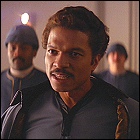 to adapt the movie script exchanged hands for a mere dollar, though the timing of The Empire Strikes Back would be part of Lucasfilm’s promotional push for Return Of The Jedi: the Empire radio series debuted early in 1983, with its ten half-hour episodes leading up to the premiere of the new movie. Hamill and Daniels were joined by Billy Dee Williams, reprising the role of Lando Calrissian, and John Lithgow joined the cast as Yoda.
to adapt the movie script exchanged hands for a mere dollar, though the timing of The Empire Strikes Back would be part of Lucasfilm’s promotional push for Return Of The Jedi: the Empire radio series debuted early in 1983, with its ten half-hour episodes leading up to the premiere of the new movie. Hamill and Daniels were joined by Billy Dee Williams, reprising the role of Lando Calrissian, and John Lithgow joined the cast as Yoda.
Any hopes for a Jedi radio show, however, were dashed for many years. This time, Lucasfilm expected KUSC to fork over more than a dollar for the trilogy’s closing act, and even the political climate provided the Rebel Alliance with a more formidable 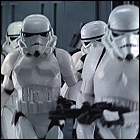 opponent than the Empire. Even as Daley’s Empire adaptation unfolded on Sundays on NPR, President Ronald Reagan was making his first public announcements about a ballistic missile defense shield system that he would later call “Star Wars” (much to Lucas’ chagrin). The sway of Reagan’s conservative administration was at its strongest, and NPR suffered funding cuts perhaps due to its frequent perception as a broadcaster with a liberal bias and an umbilical cord of government funding. The cuts kept NPR or KUSC from spending a significant amount of money on more Star Wars. Jedi would have to wait, for a very long time; NPR’s core news, arts and public affairs programming would have to take priority over something that was already well-documented – and possibly “lowbrow” – pop culture.
opponent than the Empire. Even as Daley’s Empire adaptation unfolded on Sundays on NPR, President Ronald Reagan was making his first public announcements about a ballistic missile defense shield system that he would later call “Star Wars” (much to Lucas’ chagrin). The sway of Reagan’s conservative administration was at its strongest, and NPR suffered funding cuts perhaps due to its frequent perception as a broadcaster with a liberal bias and an umbilical cord of government funding. The cuts kept NPR or KUSC from spending a significant amount of money on more Star Wars. Jedi would have to wait, for a very long time; NPR’s core news, arts and public affairs programming would have to take priority over something that was already well-documented – and possibly “lowbrow” – pop culture.
One unusual Star Wars audio project that did take place in the interim, however, was the direct-to-retail release of an audio story written by Daley, Rebel Mission To Ord Mantell, bridging the gap between Star Wars and Empire. Released by Disney 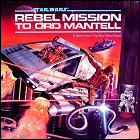 subsidiary Buena Vista Records, Ord Mantell was billed as “A Story from the Star Wars saga,” and was done in a format very similar to the NPR episodic radio dramas. It is unknown if the project was ever considered for public radio, but it seems unlikely: the sound effects are not from the Lucasfilm archives, and the cast is obviously not the same cast that played the parts of Luke, Leia, Han, et al. for NPR. At the script stage, Ord Mantell might have been an attempt at a pilot for a series of between-movie audio stories, but if that’s the case, NPR declined, and it seems that Buena Vista Records had little interest in continuing beyond this single oddball adventure.
subsidiary Buena Vista Records, Ord Mantell was billed as “A Story from the Star Wars saga,” and was done in a format very similar to the NPR episodic radio dramas. It is unknown if the project was ever considered for public radio, but it seems unlikely: the sound effects are not from the Lucasfilm archives, and the cast is obviously not the same cast that played the parts of Luke, Leia, Han, et al. for NPR. At the script stage, Ord Mantell might have been an attempt at a pilot for a series of between-movie audio stories, but if that’s the case, NPR declined, and it seems that Buena Vista Records had little interest in continuing beyond this single oddball adventure.
Just as the political climate was turning against public radio in the 1980s, the first steps toward completing the original Star Wars trilogy on audio were being taken at that time too, though no one realized it just yet. The Rebel Alliance would eventually be getting backup by way of Lake Wobegon.
In the early ’80s, Minnesota Public Radio started a for-profit offshoot company, Highbridge Audio, primarily to market recordings of the ever-popular Prairie Home Companion. Other NPR productions would be offered in recorded form by Highbridge, eventually including, in the 1990s, Star Wars and The Empire Strikes Back, which became two of Highbridge’s perennial bestsellers. It didn’t take long for someone to consider the idea of completing the trilogy, this time as a for-profit project.
The for-profit nature of the Return Of The Jedi audio dramatization, however, had a domino effect on many aspects of the production. Where Mark Hamill had previously donated his time and talent, his schedule was now stacked with animation projects which were paying top dollar for his voice talent, and had 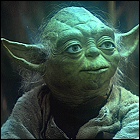 to be replaced by Joshua Fardon as the voice of Luke. Ever the droid trooper, Anthony Daniels returned as C-3PO, along with radio trilogy veterans Perry King, John Lithgow, Brock Peters, and Ann Sachs as Princess Leia. Billy Dee Williams was unavailable to reprise the role of Lando, and bizarrely the producers recast the part with a white actor. Yeardley Smith, best known as the voice of Bart Simpson, played what was virtually a bit part as one of Jabba’s palace droids. Ed Begley Jr. signed on to play Boba Fett, while veteran British stage and radio actor Martin Jarvis (Titanic, Doctor Who) took the part of one of Jabba’s strongarms. Nia Vardalos (still years away from My Big Fat Greek Wedding) played minor supporting roles. And in perhaps the strangest bit of casting, Ed Asner was cast as Jabba, repeating the Hutt’s alien language now without the benefit of subtitles.
to be replaced by Joshua Fardon as the voice of Luke. Ever the droid trooper, Anthony Daniels returned as C-3PO, along with radio trilogy veterans Perry King, John Lithgow, Brock Peters, and Ann Sachs as Princess Leia. Billy Dee Williams was unavailable to reprise the role of Lando, and bizarrely the producers recast the part with a white actor. Yeardley Smith, best known as the voice of Bart Simpson, played what was virtually a bit part as one of Jabba’s palace droids. Ed Begley Jr. signed on to play Boba Fett, while veteran British stage and radio actor Martin Jarvis (Titanic, Doctor Who) took the part of one of Jabba’s strongarms. Nia Vardalos (still years away from My Big Fat Greek Wedding) played minor supporting roles. And in perhaps the strangest bit of casting, Ed Asner was cast as Jabba, repeating the Hutt’s alien language now without the benefit of subtitles.
Near the end of the recording sessions, Brian Daley, who had adapted all three of the movies for radio, died of pancreatic cancer. The cast had even recorded a get-well message for him in character; he never got to hear it. Minor rewrites had been carried out on Daley’s scripts by John Whitman, who had adapted audio versions of the Dark Empire comics for Highbridge in 1994. Whitman would continue working with Highbridge on later Star Wars audio plays, based on Dark Forces and Crimson Empire, following Jedi‘s release; these non-movie stories were being produced specifically for the retail market, and were generally made in a long-form format rather than an episodic format suitable for radio.
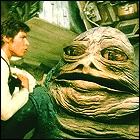 The Jedi adaptation was shorter than the previous radio series – only six half-hour episodes – and was offered to NPR by Highbridge after its retail release. Perhaps not coincidentally, it was timed to coincide with the resurgence in interest in the trilogy that came with the impending release of the restored/revised Special Editions of the movies in theaters, and the initial announcements that a new series of Star Wars movies was finally in the works.
The Jedi adaptation was shorter than the previous radio series – only six half-hour episodes – and was offered to NPR by Highbridge after its retail release. Perhaps not coincidentally, it was timed to coincide with the resurgence in interest in the trilogy that came with the impending release of the restored/revised Special Editions of the movies in theaters, and the initial announcements that a new series of Star Wars movies was finally in the works.
Considering how much importance Lucasfilm places on the licensing of Star Wars, and the fact that the Jedi adaptation was eventually undertaken as just another licensed product instead of the non-profit aim of the Star Wars and Empire adaptations, there has unsurprisingly been no discussion of adapting The Phantom Menace, Attack Of The Clones or Revenge Of The Sith for radio. Even more visual and effects-dependent than the original trilogy, the prequel trilogy seems destined to remain in movie form only.
Star Wars: The NPR Radio Drama (1981)
- A Wind To Shake The Stars
- Points Of Origin
- Black Knight, White Princess, And Pawns
- While Giants Mark Time
- Jedi That Was, Jedi To Be
- The Millennium Falcon Deal
- The Han Solo Solution
- Death Star’s Transit
- Rogues, Rebels And Robots
- The Luke Skywalker Initiative
- The Jedi Nexus
- The Case For Rebellion
- Force And Counter Force
For The Record: Ord Mantell (1983)
The Empire Strikes Back: The NPR Radio Drama (1983)
- Freedom’s Winter
- The Coming Storm
- A Question Of Survival
- Fire And Ice
- The Millennium Falcon Pursuit
- Way Of The Jedi
- New Allies, New Enemy
- Dark Lord’s Fury
- Gambler’s Choice
- The Clash Of Lightsabers
Return Of The Jedi: The Radio Drama (1996)
- Tatooine Haunts
- Fast Friends
- Prophecies And Destinies
- Pattern And Web
- So Turns A Galaxy, So Turns A Wheel
- The Blood Of A Jedi
Comics Adaptations (1994-98)
(not produced for NPR)
- Dark Forces: Soldier For The Empire – Part I
- Dark Forces: Soldier For The Empire – Part II
- Dark Forces: Rebel Agent – Part I
- Dark Forces: Rebel Agent – Part II
- Dark Forces: Jedi Knight – Part I
- Dark Forces: Jedi Knight – Part II
Essay and LogBook entries by Earl Green
Episode synopses originally appeared in theLogBook.com’s TheatEar section.
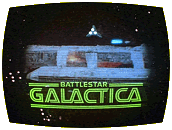 The end of a millennium-long war between a distant race of humans and their cybernetic enemy, the Cylons, looms as a peace summit draws closer. But the humans’ aspirations for an end to the war are crushed when the peace meeting turns out to be a well-orchestrated trap, drawing the fleet of heavily armed Battlestars away from the humans’ homeworlds. Only Galactica, a Battlestar under the leadership of Commander Adama, survives the attack, but to no avail – the Twelve Colonies of Man have been besieged and all but destroyed by the Cylons. A massaive evacuation of the survivors, filling every habitable space aboard a fleet of 200 ships, takes place, with Galactica leading them. Adama announces an unprecedented contingency plan – he plans to lead the fleet to a legendary planet called Earth, believed to be the thirteenth Colony.
The end of a millennium-long war between a distant race of humans and their cybernetic enemy, the Cylons, looms as a peace summit draws closer. But the humans’ aspirations for an end to the war are crushed when the peace meeting turns out to be a well-orchestrated trap, drawing the fleet of heavily armed Battlestars away from the humans’ homeworlds. Only Galactica, a Battlestar under the leadership of Commander Adama, survives the attack, but to no avail – the Twelve Colonies of Man have been besieged and all but destroyed by the Cylons. A massaive evacuation of the survivors, filling every habitable space aboard a fleet of 200 ships, takes place, with Galactica leading them. Adama announces an unprecedented contingency plan – he plans to lead the fleet to a legendary planet called Earth, believed to be the thirteenth Colony.written by Glen A. Larson


 With the advent of television in America, the radio drama – a staple of wartime and post-war American radio listening – gradually became all but extinct. Even if the audience hadn’t shifted toward TV, the talent behind radio was making a beeline for Hollywood to stake a claim on the new medium. Radio drama made a modest comeback in the 1970s via the newly-established National Public Radio, but never quite on the scale of radio drama’s heyday in the war years. Radio theater remained the domain of talented amateurs and occasional public broadcasting showcases. Even NPR found itself leaning heavily on the still-active radio drama scene in England – it was more financially expedient to buy rebroadcast rights to already-produced British radio shows such as The Lord Of The Rings and The Hitchhiker’s Guide To The Galaxy, which instantly gained avid American fan followings. Comedy fared better: Garrison Keillor’s Prairie Home Companion became a mainstay of NPR’s non-news-based offerings.
With the advent of television in America, the radio drama – a staple of wartime and post-war American radio listening – gradually became all but extinct. Even if the audience hadn’t shifted toward TV, the talent behind radio was making a beeline for Hollywood to stake a claim on the new medium. Radio drama made a modest comeback in the 1970s via the newly-established National Public Radio, but never quite on the scale of radio drama’s heyday in the war years. Radio theater remained the domain of talented amateurs and occasional public broadcasting showcases. Even NPR found itself leaning heavily on the still-active radio drama scene in England – it was more financially expedient to buy rebroadcast rights to already-produced British radio shows such as The Lord Of The Rings and The Hitchhiker’s Guide To The Galaxy, which instantly gained avid American fan followings. Comedy fared better: Garrison Keillor’s Prairie Home Companion became a mainstay of NPR’s non-news-based offerings. show’s producers: the Star Wars sound effects would be available to them in their raw form, along with every note of John Williams’ music, including selections that had yet to appear on an album. The somewhat unenviable task of translating a visual-effects-heavy blockbuster to the spoken word was given to writer Brian Daley, who had already produced some of the earliest official Star Wars print fiction that didn’t merely adapt the two movies so far (“Han Solo And The Lost Legacy,” “
show’s producers: the Star Wars sound effects would be available to them in their raw form, along with every note of John Williams’ music, including selections that had yet to appear on an album. The somewhat unenviable task of translating a visual-effects-heavy blockbuster to the spoken word was given to writer Brian Daley, who had already produced some of the earliest official Star Wars print fiction that didn’t merely adapt the two movies so far (“Han Solo And The Lost Legacy,” “ a “look” into Luke Skywalker’s dull Tatooine life (and constantly being teased by his friends for being a dreamer of far-fetched dreams), and his friendship with future Rebel pilot Biggs. Also explored was Princess Leia’s life on Alderaan with her father, Bail Organa, and their activities with the the Rebel Alliance leading up to the theft of the Death Star plans. If one can overlook a certain naivete on Bail Organa’s part when it comes to the Rebellion (in the prequel trilogy, Organa is shown to be one of the Rebellion’s founding fathers, not hesitating to rescue and shelter the last two Jedi Knights known to have survived the Emperor’s “Order 66”), the events portrayed actually track very well with the story revelations that came in the later movies.
a “look” into Luke Skywalker’s dull Tatooine life (and constantly being teased by his friends for being a dreamer of far-fetched dreams), and his friendship with future Rebel pilot Biggs. Also explored was Princess Leia’s life on Alderaan with her father, Bail Organa, and their activities with the the Rebel Alliance leading up to the theft of the Death Star plans. If one can overlook a certain naivete on Bail Organa’s part when it comes to the Rebellion (in the prequel trilogy, Organa is shown to be one of the Rebellion’s founding fathers, not hesitating to rescue and shelter the last two Jedi Knights known to have survived the Emperor’s “Order 66”), the events portrayed actually track very well with the story revelations that came in the later movies. fame, and future TV and movie stars still in the early stages of their careers. Mark Hamill and Anthony Daniels reprised their roles of Luke Skywalker and C-3PO, while familiar sound effects eliminated the need to recast R2-D2 or Chewbacca. Though he lost the role to Harrison Ford on film, Perry King finally got his opportunity to play Han Solo on the radio. Brock Peters took over for James Earl Jones as the voice of Darth Vader. Other future “names” such as David Alan Grier, Jerry Hardin and Meschach Taylor joined Hamill and the others in donating their time for free in exchange for a unique experience: radio Star Wars would almost certainly be one of the most-listened-to NPR broadcasts ever, and might even lead to a resurgence in the medium of American-made radio drama. With such a high-visibility (audibility?) project and their future career profiles to consider, why not?
fame, and future TV and movie stars still in the early stages of their careers. Mark Hamill and Anthony Daniels reprised their roles of Luke Skywalker and C-3PO, while familiar sound effects eliminated the need to recast R2-D2 or Chewbacca. Though he lost the role to Harrison Ford on film, Perry King finally got his opportunity to play Han Solo on the radio. Brock Peters took over for James Earl Jones as the voice of Darth Vader. Other future “names” such as David Alan Grier, Jerry Hardin and Meschach Taylor joined Hamill and the others in donating their time for free in exchange for a unique experience: radio Star Wars would almost certainly be one of the most-listened-to NPR broadcasts ever, and might even lead to a resurgence in the medium of American-made radio drama. With such a high-visibility (audibility?) project and their future career profiles to consider, why not? to adapt the movie script exchanged hands for a mere dollar, though the timing of The Empire Strikes Back would be part of Lucasfilm’s promotional push for Return Of The Jedi: the Empire radio series debuted early in 1983, with its ten half-hour episodes leading up to the premiere of the new movie. Hamill and Daniels were joined by Billy Dee Williams, reprising the role of Lando Calrissian, and John Lithgow joined the cast as Yoda.
to adapt the movie script exchanged hands for a mere dollar, though the timing of The Empire Strikes Back would be part of Lucasfilm’s promotional push for Return Of The Jedi: the Empire radio series debuted early in 1983, with its ten half-hour episodes leading up to the premiere of the new movie. Hamill and Daniels were joined by Billy Dee Williams, reprising the role of Lando Calrissian, and John Lithgow joined the cast as Yoda. opponent than the Empire. Even as Daley’s Empire adaptation unfolded on Sundays on NPR, President Ronald Reagan was making his first public announcements about a ballistic missile defense shield system that he would later call “Star Wars” (much to Lucas’ chagrin). The sway of Reagan’s conservative administration was at its strongest, and NPR suffered funding cuts perhaps due to its frequent perception as a broadcaster with a liberal bias and an umbilical cord of government funding. The cuts kept NPR or KUSC from spending a significant amount of money on more Star Wars. Jedi would have to wait, for a very long time; NPR’s core news, arts and public affairs programming would have to take priority over something that was already well-documented – and possibly “lowbrow” – pop culture.
opponent than the Empire. Even as Daley’s Empire adaptation unfolded on Sundays on NPR, President Ronald Reagan was making his first public announcements about a ballistic missile defense shield system that he would later call “Star Wars” (much to Lucas’ chagrin). The sway of Reagan’s conservative administration was at its strongest, and NPR suffered funding cuts perhaps due to its frequent perception as a broadcaster with a liberal bias and an umbilical cord of government funding. The cuts kept NPR or KUSC from spending a significant amount of money on more Star Wars. Jedi would have to wait, for a very long time; NPR’s core news, arts and public affairs programming would have to take priority over something that was already well-documented – and possibly “lowbrow” – pop culture. subsidiary Buena Vista Records, Ord Mantell was billed as “A Story from the Star Wars saga,” and was done in a format very similar to the NPR episodic radio dramas. It is unknown if the project was ever considered for public radio, but it seems unlikely: the sound effects are not from the Lucasfilm archives, and the cast is obviously not the same cast that played the parts of Luke, Leia, Han, et al. for NPR. At the script stage, Ord Mantell might have been an attempt at a pilot for a series of between-movie audio stories, but if that’s the case, NPR declined, and it seems that Buena Vista Records had little interest in continuing beyond this single oddball adventure.
subsidiary Buena Vista Records, Ord Mantell was billed as “A Story from the Star Wars saga,” and was done in a format very similar to the NPR episodic radio dramas. It is unknown if the project was ever considered for public radio, but it seems unlikely: the sound effects are not from the Lucasfilm archives, and the cast is obviously not the same cast that played the parts of Luke, Leia, Han, et al. for NPR. At the script stage, Ord Mantell might have been an attempt at a pilot for a series of between-movie audio stories, but if that’s the case, NPR declined, and it seems that Buena Vista Records had little interest in continuing beyond this single oddball adventure. to be replaced by Joshua Fardon as the voice of Luke. Ever the droid trooper, Anthony Daniels returned as C-3PO, along with radio trilogy veterans Perry King, John Lithgow, Brock Peters, and Ann Sachs as Princess Leia. Billy Dee Williams was unavailable to reprise the role of Lando, and bizarrely the producers recast the part with a white actor. Yeardley Smith, best known as the voice of Bart Simpson, played what was virtually a bit part as one of Jabba’s palace droids.
to be replaced by Joshua Fardon as the voice of Luke. Ever the droid trooper, Anthony Daniels returned as C-3PO, along with radio trilogy veterans Perry King, John Lithgow, Brock Peters, and Ann Sachs as Princess Leia. Billy Dee Williams was unavailable to reprise the role of Lando, and bizarrely the producers recast the part with a white actor. Yeardley Smith, best known as the voice of Bart Simpson, played what was virtually a bit part as one of Jabba’s palace droids.  The Jedi adaptation was shorter than the previous radio series – only six half-hour episodes – and was offered to NPR by Highbridge after its retail release. Perhaps not coincidentally, it was timed to coincide with the resurgence in interest in the trilogy that came with the impending release of the restored/revised Special Editions of the movies in theaters, and the initial announcements that a new series of Star Wars movies was finally in the works.
The Jedi adaptation was shorter than the previous radio series – only six half-hour episodes – and was offered to NPR by Highbridge after its retail release. Perhaps not coincidentally, it was timed to coincide with the resurgence in interest in the trilogy that came with the impending release of the restored/revised Special Editions of the movies in theaters, and the initial announcements that a new series of Star Wars movies was finally in the works.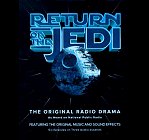 On Tatooine, Luke Skywalker is occupying Ben Kenobi’s old desert hut, preparing a new lightsaber for himself – to be wielded in the artificial hand that has replaced the one Darth Vader cut off at Cloud City. A carefully orchestrated plan to rescue Han Solo from Jabba the Hutt is finally set into motion, despite Lando Calrissian and Chewbacca having seemingly vanished after coming to Tatooine themselves. Luke sends R2-D2 and C-3PO to Jabba, with orders for Artoo to play a message Luke has recorded for Jabba’s eyes only. But when Artoo plays that message, Threepio is horrified to hear Luke’s voice offering the droids to Jabba as a gift – as a token of his esteem in hopes that a deal regarding Han Solo can be worked out. Artoo is pressed into service as a waiter aboard Jabba’s sail barge, and Threepio is forced to serve as the sluglike ganglord’s interpreter. A new bounty hunter, Boussh, arrives – with Chewbacca in chains. Jabba is delighted by the new arrival and allows Boussh to stay in his palace, but the bounty hunter is not all that he – or she – appears.
On Tatooine, Luke Skywalker is occupying Ben Kenobi’s old desert hut, preparing a new lightsaber for himself – to be wielded in the artificial hand that has replaced the one Darth Vader cut off at Cloud City. A carefully orchestrated plan to rescue Han Solo from Jabba the Hutt is finally set into motion, despite Lando Calrissian and Chewbacca having seemingly vanished after coming to Tatooine themselves. Luke sends R2-D2 and C-3PO to Jabba, with orders for Artoo to play a message Luke has recorded for Jabba’s eyes only. But when Artoo plays that message, Threepio is horrified to hear Luke’s voice offering the droids to Jabba as a gift – as a token of his esteem in hopes that a deal regarding Han Solo can be worked out. Artoo is pressed into service as a waiter aboard Jabba’s sail barge, and Threepio is forced to serve as the sluglike ganglord’s interpreter. A new bounty hunter, Boussh, arrives – with Chewbacca in chains. Jabba is delighted by the new arrival and allows Boussh to stay in his palace, but the bounty hunter is not all that he – or she – appears.
